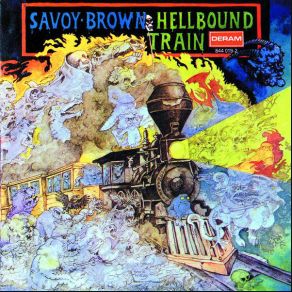Hellbound Train
Download links and information about Hellbound Train by Savoy Brown. This album was released in 1972 and it belongs to Blues, Rock, Blues Rock, Hard Rock, Heavy Metal, Country, Pop, Alternative genres. It contains 7 tracks with total duration of 33:19 minutes.

|
|
|---|---|
| Artist: | Savoy Brown |
| Release date: | 1972 |
| Genre: | Blues, Rock, Blues Rock, Hard Rock, Heavy Metal, Country, Pop, Alternative |
| Tracks: | 7 |
| Duration: | 33:19 |
| Buy it NOW at: | |
| Buy on iTunes $4.99 | |
| Buy on iTunes $8.99 | |
| Buy on Amazon $4.99 | |
| Buy on Amazon $1.29 | |
| Buy on Amazon $24.99 | |
| Buy on Songswave €1.77 | |
| Buy on Songswave €0.94 | |
Tracks
[Edit]| No. | Title | Length |
|---|---|---|
| 1. | Doin Fine | 2:47 |
| 2. | Lost and Lonely Child | 5:59 |
| 3. | I'll Make Everything Alright | 3:19 |
| 4. | Troubled by These Days and Times | 5:43 |
| 5. | If I Could See an End | 2:55 |
| 6. | It'll Make You Happy | 3:26 |
| 7. | Hellbound Train | 9:10 |
Details
[Edit]Comprising the same lineup as Street Corner Talking, Savoy Brown released Hellbound Train a year later. For this effort, Kim Simmonds' guitar theatrics are toned down a bit and the rest of the band seems to be a little less vivid and passionate with their music. The songs are still draped with Savoy Brown's sleek, bluesy feel, but the deep-rooted blues essence that so easily emerged from their last album doesn't rise as high throughout Hellbound Train's tracks. The title cut is most definitely the strongest, with Dave Walker, Simmonds, and Paul Raymond sounding tighter than on any other song, and from a wider perspective, Andy Silvester's bass playing is easily Hellbound's most complimenting asset. On tracks like "Lost and Lonely Child," "Doin' Fine," and "If I Could See an End," the lifeblood of the band doesn't quite surge into the music as it did before, and the tracks become only average-sounding blues efforts. Because of Savoy Brown's depth of talent, this rather nonchalant approach doesn't make Hellbound Train a "bad" album by any means — it just fails to equal the potency of its predecessor. But there is a noticeable difference in the albums that followed this one, as the band and especially Simmonds himself was beginning to show signs of fatigue, and a significant decline in the group's overall sound was rapidly becoming apparent.